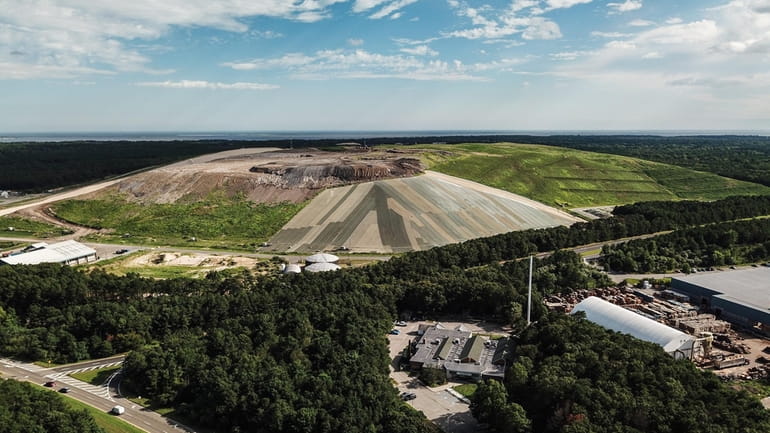Plume of 'forever' chemicals found south of Brookhaven town landfill, DEC says

The Brookhaven landfill looking south near Horseblock Road in Yaphank Tuesday. Credit: Newsday/Steve Pfost
A plume containing higher than allowed levels of harmful "forever chemicals" has been detected in the groundwater south of the Brookhaven Landfill but the contamination presents no "new threats" to drinking water, Department of Environmental Conservation officials said this week.
Groundwater testing conducted by Brookhaven Town in late-2022 found a class of toxic chemicals known as PFAS, along with 1,4-dioxane — classified as a likely human carcinogen — in multiple groundwater monitoring wells near the town-run landfill that exceed the standards set by the state in February. Sampling results indicate there may also be a second contaminant plume nearby.
In the coming weeks, the state will require the town to implement a plan that notifies the public, addresses the extent and source of the intrusion, its potential impact on local residents, fish and wildlife and how to remove the "emerging contaminants." The town must also host a public meeting to discuss its plan.
Possible corrective measures, which must be approved by the DEC, could include shutting the landfill, which is already set to close in the coming years, or excavating a portion or all of the facility, wrote Syed Rahman, the department's regional materials management supervisor in an Aug. 8 letter to the town.
WHAT TO KNOW
- At least one, and potentially a second plume of toxic chemicals, including PFOA, PFOS, and 1,4-Dioxane have been detected in the groundwater south of the Brookhaven landfill, according to the State Department of Environmental Conservation
- The contaminants are collectively known as "forever chemicals" because they build up in the body and never break down in the environment and have been linked to a broad range of health issues in humans
- Brookhaven Town must now implement a plan to address the extent and source of the intrusion, its impact on the public and a plan to remediate the plume, including potentially shuttering the landfill
The contaminants, collectively known as "forever chemicals" because they build up in the body and never break down in the environment, have been linked to a broad range of health issues in humans. But the DEC stopped short of suggesting the Yaphank landfill be classified as a Superfund site.
"Required sampling found levels of the emerging contaminants PFOA, PFOS, and 1,4-Dioxane in exceedance of groundwater guidance values in the landfill’s on-site monitoring wells downgradient of the waste mass," wrote Alanah Keddell-Tuckey, director of the DEC's Office of Environmental Justice, in a letter to the town.
DEC officials say the intrusion is not a threat to public health. They point to efforts by Suffolk County and the town, unrelated to the current contamination, to hook homes in the area to public water sources where private wells showed contamination or installing treatment at locations exceeding the drinking water standards.
"There are no new threats to drinking water as there are no public water supply wells downgradient of the landfill," the DEC said in a statement.
A private well survey conducted by the Suffolk County Department of Health Services last year found 12 properties in the vicinity of the landfill utilize on-site private wells for drinking water. The county sampled six of the properties, officials said, and one was found to have PFAS levels exceeding state standards. That homeowner was offered a public water connection by the DEC but declined the offer
In a statement, Christine Fetten, Brookhaven's commissioner of recycling and sustainable materials management, said the testing sampling results were not surprising.
"PFAS are found in hundreds of consumer and household products sold across the United States and over the world — in everything from Teflon coated cooking pans, plastic drinkware, contact lenses and coated food wrappers to clothing, carpeting and building materials, fire damaged building debris," Fetten wrote. "Because these products are disposed in household and construction and demolition debris, their presence is expected to be found in landfills."
Suffolk's Department of Health Services began testing for emerging contaminants near the landfill in 2017 and continued through last year. The town began quarterly testing at the landfill in 2022 at the request of the DEC, which requires the operators of all active landfills to sample groundwater for these chemicals.
Adrienne Esposito, executive director of the Farmingdale-based Citizens Campaign for the Environment, said the contaminants are a serious concern for private well owners and for the Carmans River and the Great South Bay, which are nearby.
"This is a huge concern," Esposito said. "We don't know how long these toxic chemicals have been in a plume south of the landfill. They only started testing a year ago, but the plumes have existed potentially for far longer than that."
Brookhaven NAACP President Georgette Grier-Key said the findings underscore why they are "deeply concerned" about plans to build a large waste transfer station three miles from the landfill.
“If the town can’t protect us from its own operations, why should we trust them to protect us from this massive privately operated dump?” Grier-Key said.
Brookhaven now becomes the latest Long Island community to find itself struggling with a complicated and potentially expensive environmental cleanup.
In 2019, the state added a portion of the East Hampton Airport to its Superfund registry. In February the DEC declared Long Island MacArthur Airport in Ronkonkoma as a state Superfund site after detecting "significant" chemical contamination in groundwater and soil.
And the state has formalized an agreement with Northrop Grumman to clean up pollution coming from the company’s former Bethpage operations, Long Island’s largest mass of groundwater pollution.
The landfill, originally owned by the state when it opened in 1974, was transferred to the town about a decade later.
Since about 1990, when Long Island towns began incinerating solid waste, the landfill has taken ash from Covanta waste-to-energy plants in Westbury and Huntington, as well as construction and demolition debris from private carters. Supervisor Edward P. Romaine has said the landfill will stop taking certain kinds of debris in December 2024 and cease accepting ash one or two years later.
With Carl MacGowan and Mark Harrington

